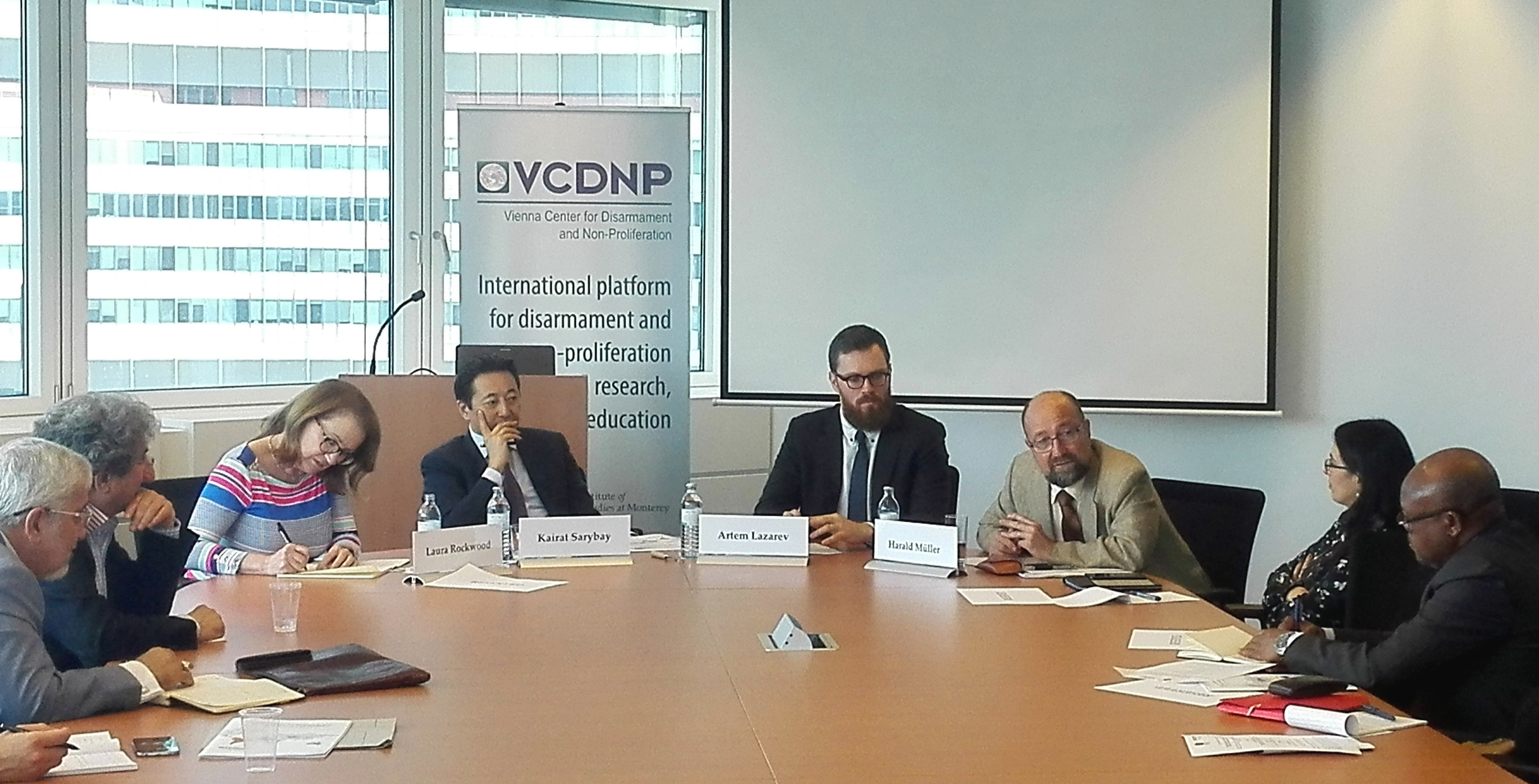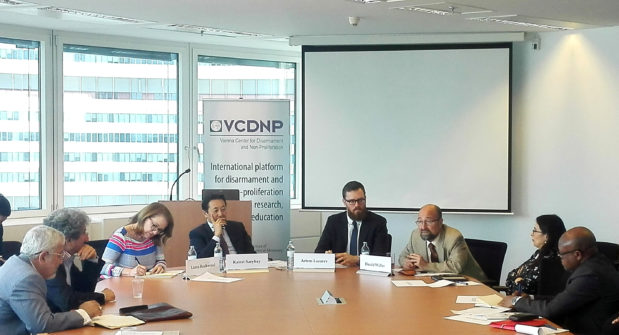
In spring 2017, the VCDNP convened a Task Force in order to examine how cooperation could be enhanced among the nuclear-weapon-free zones. Earlier this year, the Task Force produced a report entitled “Cooperation among Nuclear-Weapon-Free Zones: History, Challenges and Recommendations,” which was presented on 17 April 2018 at the VCDNP. Moderated by VCDNP Research Associate Artem Lazarev, the speakers included two Task Force members – its co-chair Dr. Harald Müller and Ambassador Kairat Sarybay (Kazakhstan). VCDNP Executive Director Laura Rockwood provided welcoming remarks.

Dr. Müller began his presentation by explaining the main purpose for convening the Task Force before moving to an in-depth analysis of the findings and recommendations outlined in the report. He emphasized that, historically, cooperation among the nuclear-weapon-free zones (NWFZs) had not been comprehensive, systematic nor sustainable. He also touched on the plethora of challenges to this cooperation, such as the low level of institutionalization both within and among NWFZs, difficulties in finding and expressing common positions among each zone, and a lack of continuity or momentum at conferences of NWFZ members.
Dr. Müller’s presentation continued with a summary of the Task Force’s recommendations as to how cooperation could be enhanced among NWFZs. The first set of recommendations concerned communication and institutionalization of contacts. In particular, it was suggested that each zone establish a secretarial mechanism to aid coordination within the zone and that a global NWFZ website be created to enhance communication among the zones.
The second set of recommendations was related to research and analysis on matters of common interest and importance. The report suggested, for example, that NWFZ States exchange experiences on issues of shared interest; study the possibility of establishing new single‑State NWFZs and creating NWFZs in Europe, the Far East, the Middle East and South Asia; promote the mandate of a study on NWFZs by the UN General Assembly (UNGA); and study NWFZ States' positions on the prohibition of transit of nuclear weapons, especially in the context of the Treaty on the Prohibition of Nuclear Weapons.
Disarmament and non-proliferation education comprised the third set of recommendations, which, according to the report, was among the least controversial issues. Dr. Müller stressed that the need to promote education and build capacity in this area was widely recognized. It was recommended that NWFZ States explore various joint endeavours in this regard, such as offering regional short courses on nuclear disarmament, non‑proliferation and other NWFZ-relevant issues; providing online courses for diplomats and secretariat personnel from the different NWFZs and regional institutions; and preparing learning materials on the politics and ethics surrounding NWFZs for high school and graduate courses.
The fourth set of recommendations focused on NWFZs cooperation with international organizations and within multilateral fora. The cooperation partners could include, for instance, the UN Office for Disarmament Affairs, UN Regional Centres for Peace and Disarmament and the International Atomic Energy Agency. Dr. Müller specified that the zones could cooperate on an annual NWFZ draft resolution in the UNGA, articulate common positions on nuclear disarmament and other relevant issues in the framework of multilateral organizations and negotiations, and develop the capability to respond jointly in the event of a nuclear crises.
Dr. Müller concluded that NWFZs have the potential to become a major force in the move towards a world without nuclear weapons. This potential can only be ensured if the zones cooperate fully, emphasizing that a robust cooperation initiative by NWFZs would be timely and desirable.
Turning to the second speaker, Ambassador Sarybay examined the role of NWFZs and outlined past and present initiatives by Kazakhstan in the area of disarmament and non-proliferation.
Ambassador Sarybay underlined that all five NWFZs combined comprise 115 States and cover the entire southern hemisphere. He further added that the zones are in a “unique position” to work collaboratively on proposals to create NWFZs in the Middle East, South and Northeast Asia, and Central Europe, bringing us another step closer towards a nuclear-weapon-free world. According to Ambassador Sarybay, the more consolidated NWFZs are, the more significant their stance is vis-à-vis nuclear-weapon States. The collective voice of the zones would benefit the promotion of safe and secure peaceful uses of nuclear energy as well as the rehabilitation of nuclear sites.
Speaking from Kazakhstan’s experience, Ambassador Sarybay reminded the audience that the decision by President Nursultan Nazarbayev to close the Semipalatinsk nuclear test site on 29 August 1991, led Kazakhstan to be the first State in history to ban nuclear tests. He also stressed that the UN General Assembly had proclaimed that day as the International Day against Nuclear Tests, and highlighted that the city of Semipalatinsk was chosen as the location best suited for the signing ceremony of the Treaty on the NWFZ in Central Asia.
Ambassador Sarybay also reiterated Kazakhstan’s commitment to enhancing cooperation among the zones through, for example, forming a consortium of NWFZs. He mentioned that in August 2017 President Nazarbayev had expressed readiness to convene a meeting of NWFZ States in Kazakhstan to discuss ways to bolster the creation of new zones.
A session of comments, questions and answers followed the presentations, during which one commenter suggested an unusual solution to overcoming the existing stalemate in the negotiation process on creating a Middle East NWFZ. The idea was not to create a separate zone, rather, to accept the countries of the region into either the Central Asian or African NWFZs. The participants and the audience shared their doubts about the feasibility of this idea but nevertheless praised its creativity and underlined the urgent need for talks to resume on the establishment of the zone.